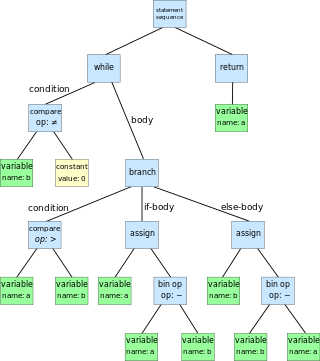In computer science, a recursive descent parser is a kind of top-down parser built from a set of mutually recursive procedures where each such procedure implements one of the nonterminals of the grammar. Thus the structure of the resulting program closely mirrors that of the grammar it recognizes.

An abstract syntax tree (AST) is a data structure used in computer science to represent the structure of a program or code snippet. It is a tree representation of the abstract syntactic structure of text written in a formal language. Each node of the tree denotes a construct occurring in the text. It is sometimes called just a syntax tree.

In computing, Xerces is Apache's collection of software libraries for parsing, validating, serializing and manipulating XML. The library implements a number of standard APIs for XML parsing, including DOM, SAX and SAX2. The implementation is available in the Java, C++ and Perl programming languages.
JavaCC is an open-source parser generator and lexical analyzer generator written in the Java programming language.

Apache Ant is a software tool for automating software build processes for Java applications which originated from the Apache Tomcat project in early 2000 as a replacement for the Make build tool of Unix. It is similar to Make, but is implemented using the Java language and requires the Java platform. Unlike Make, which uses the Makefile format, Ant uses XML to describe the code build process and its dependencies.

Apache Groovy is a Java-syntax-compatible object-oriented programming language for the Java platform. It is both a static and dynamic language with features similar to those of Python, Ruby, and Smalltalk. It can be used as both a programming language and a scripting language for the Java Platform, is compiled to Java virtual machine (JVM) bytecode, and interoperates seamlessly with other Java code and libraries. Groovy uses a curly-bracket syntax similar to Java's. Groovy supports closures, multiline strings, and expressions embedded in strings. Much of Groovy's power lies in its AST transformations, triggered through annotations.
Apache Lucene is a free and open-source search engine software library, originally written in Java by Doug Cutting. It is supported by the Apache Software Foundation and is released under the Apache Software License. Lucene is widely used as a standard foundation for production search applications.
In computer-based language recognition, ANTLR, or ANother Tool for Language Recognition, is a parser generator that uses a LL(*) algorithm for parsing. ANTLR is the successor to the Purdue Compiler Construction Tool Set (PCCTS), first developed in 1989, and is under active development. Its maintainer is Professor Terence Parr of the University of San Francisco.
Apache FreeMarker is a free Java-based template engine, originally focusing on dynamic web page generation with MVC software architecture. It can now generate text based on templates and changing data. It has no dependency on servlets or HTTP or HTML.
Apache Velocity first released in April 2001, is a Java-based template engine that provides a template language to reference objects defined in Java code. It aims to ensure clean separation between the presentation tier and business tiers in a Web application.

DSpace is an open source repository software package typically used for creating open access repositories for scholarly and/or published digital content. While DSpace shares some feature overlap with content management systems and document management systems, the DSpace repository software serves a specific need as a digital archives system, focused on the long-term storage, access and preservation of digital content. The optional DSpace registry lists almost three thousand repositories all over the world.
A Technology Compatibility Kit (TCK) is a suite of tests that at least nominally checks a particular alleged implementation of a Java Specification Request (JSR) for compliance. It is one of the three required pieces for a ratified JSR in the Java Community Process, which are:
This is a list of notable lexer generators and parser generators for various language classes.

Apache OFBiz is an open source enterprise resource planning (ERP) system. It provides a suite of enterprise applications that integrate and automate many of the business processes of an enterprise.

Apache Jena is an open source Semantic Web framework for Java. It provides an API to extract data from and write to RDF graphs. The graphs are represented as an abstract "model". A model can be sourced with data from files, databases, URLs or a combination of these. A model can also be queried through SPARQL 1.1.
Thrift is an IDL and binary communication protocol used for defining and creating services for programming languages. It was developed by Facebook. Since 2020, it is an open source project in the Apache Software Foundation.

Solr is an open-source enterprise-search platform, written in Java. Its major features include full-text search, hit highlighting, faceted search, real-time indexing, dynamic clustering, database integration, NoSQL features and rich document handling. Providing distributed search and index replication, Solr is designed for scalability and fault tolerance. Solr is widely used for enterprise search and analytics use cases and has an active development community and regular releases.

Apache Pivot is an open-source platform for building rich web applications in Java or any JVM-compatible language. It is released under the Apache License version 2.0.
StormCrawler is an open-source collection of resources for building low-latency, scalable web crawlers on Apache Storm. It is provided under Apache License and is written mostly in Java.








